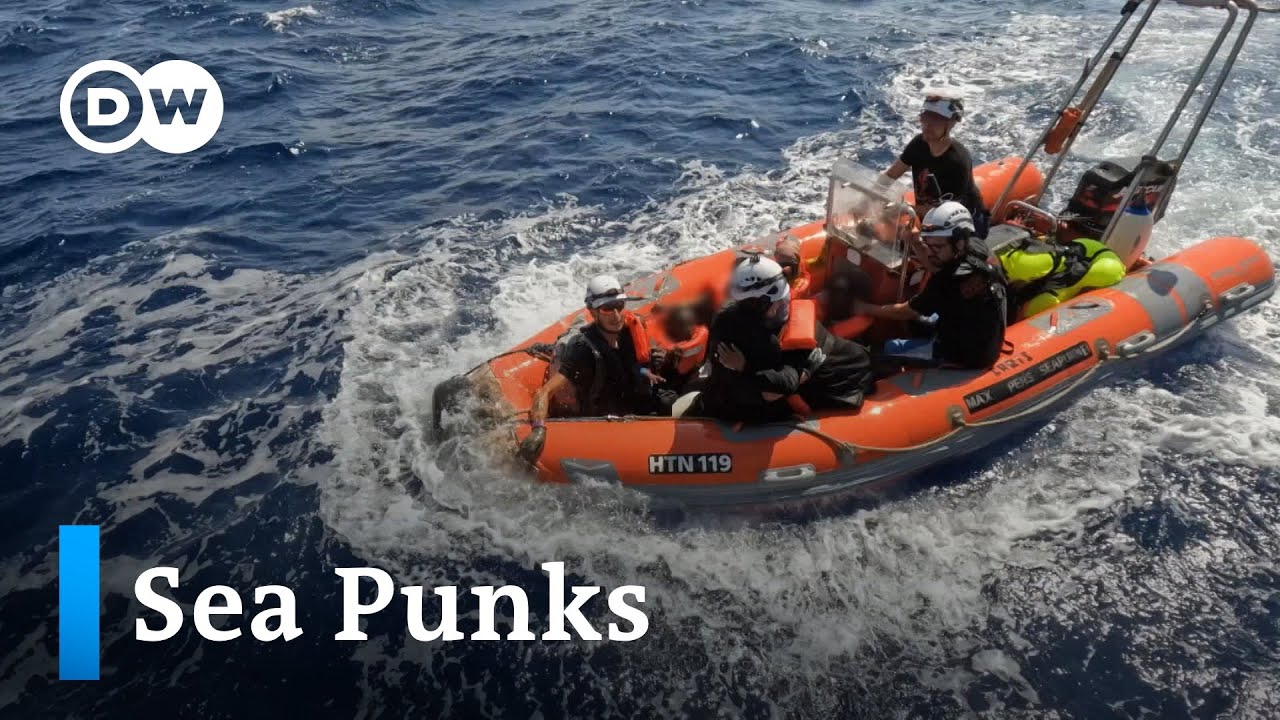Lifesavers on the Mediterranean | DW Documentary
The Sea Punk I rescue ship is embarking on its first Mediterranean mission. The crew has only just completed its lifesaving training. It’s about to be put to the test — the task is to save refugees from drowning.
Gerson Reschke registered the Sea Punks society with like-minded people in 2020. The plan was to launch a fundraising campaign, buy a ship and use it to rescue refugees. The group couldn’t stand by any longer and watch as refugees continued to drown. The Mediterranean Sea is still the world’s deadliest border. Over 3,000 people died trying to cross it in 2023, hoping to escape conflict and persecution in their home countries.
The film follows Sea Punks from the purchase and conversion of a new ship, to the group’s first rescue operation. Law student Anouck Soubeyran, 25, is a member of the international crew. It’s the Frenchwoman’s first mission. Her task is to coordinate the rescue from a distance, in a dinghy. Kristina Hilz (28), a trainee doctor from Schleswig-Holstein, is also on board as a volunteer. She is responsible for the medical care of weak or injured refugees. The volunteer crew knows what could await them at sea. They are aware of the potential psychological strain. Their ship can hold up to 100 people, but no one knows what condition the refugees will be in when they’re found.
After ten days of training, the team of 13 sets off from Spain for the Tunisian coast. They soon discover a boat carrying over 40 people from Benin in West Africa. The occupants have been at sea for three days, without food, drink or shelter from the sun. Some of the children are in critical condition. The rescue crew, still inexperienced, needs to get everything right.
#documentary #dwdocumentary
______
DW Documentary gives you knowledge beyond the headlines. Watch top documentaries from German broadcasters and international production companies. Meet intriguing people, travel to distant lands, get a look behind the complexities of daily life and build a deeper understanding of current affairs and global events. Subscribe and explore the world around you with DW Documentary.
Subscribe to:
⮞ DW Documentary (English): https://www.youtube.com/dwdocumentary
⮞ DW Documental (Spanish): https://www.youtube.com/dwdocumental
⮞ DW Documentary وثائقية دي دبليو (Arabic): https://www.youtube.com/dwdocarabia
⮞ DW Doku (German): https://www.youtube.com/dwdoku
⮞ DW Documentary हिन्दी (Hindi): https://www.youtube.com/dwdochindi
For more visit: http://www.dw.com/en/tv/docfilm/s-3610
Follow DW Documentary on Instagram: https://www.instagram.com/dwdocumentary/
Follow DW Documental on Facebook: https://www.facebook.com/dwdocumental
We kindly ask viewers to read and stick to the DW netiquette policy on our channel: https://p.dw.com/p/MF1G

19 comments
Supporting the loss of life
Politically motivated and practically naive "activists" with absolutely no relevant experience are quickly given minimal training to engage in high stakes rescues on the open seas in an area proven to be deadly dangerous. What could possibly go wrong?
(BTW – l'm a retired USCG NCO with a couple of decades of open water search and rescue training and experience.)
Unsubbed. I kmow lives destroyed by the 'saved' ones. Some not even from war torn countries. Going back each year for the holidays.
Human trafficking
(((Volunteers)))
So aiding and abetting a mass migration Europe can barely support as it is, just so they can wear their little halo and pat themselves on the back.
Disgraceful, they wouldn't bring them into their own homes, they are not helping at all but making a huge mess of Europe
who will pay for da refugees?
So these are the tools the globalist use to perpetuate illegal immigration.
Make sure you take them back to their country of origin after you save them and charge that country for saving them
gfus
All lies they all have the same story don’t trust them it’s what they are told to tell you by other people that crossed
Most of them look like strong ,young men…..
Trouble for the host countries……..
If they do not bring them back to country of origin, they are doing something wrong. Making this safer by rescuing people means more people will try to cross. Saving lives is good. But do it the right way instead of trafficking them to Europe. If you really want to save these people, make sure they do not try to cross in the first place.
Lifetakers on the Mediterranean a DW documentary
All they do is encourage more and more people to risk their lives to make it to the other side.
Such "rescues" are only getting more people killed! They encourage the continuation of the economic invasion of Europe by desperate people who have been fed lies by their mules and Globalist Elites alike.
Take into consideration its Europe that lends money and food for these failed peoples and cultures, only for us letting them in by the thousands, Some Camp of Saints material right there….
Traitors should be in jail along with illegal Muslims